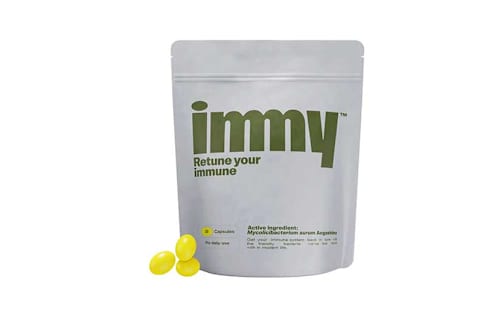Advertisement
How This One Bacteria Can Improve Immune Function & Mental Health*

When was the last time you thought about your immune system? If you're like most people, it was probably the last time you felt a little under the weather. However, immune health can do more than fight off bugs, as it also influences our gut, brain, mood, and overall inflammatory balance.
With that in mind, it's time to rethink our approach to immune support. Here, learn how a unique variant of bacteria—found in immy's revolutionary supplement—can support your immune function, starting with your gut.*
Meet the expert
Dr. Charles Akle
Physician Charles Akle is immy's chief medical officer. With over 40 years of experience in medicine and immunology, he has helped pave the way for us to understand the complex relationship between our gut microbiome and immune system.
A refresher: The gut microbiome & its role in immune, brain & inflammatory status
By definition, the gut microbiome is the group of microorganisms1 in your intestines. This includes about 100 trillion bacteria, fungi, yeast, and viruses, which work together to regulate various functions in the body. They also control levels of harmful microorganisms, including those that cause suboptimal health.
Essentially, the gut microbiome is a key player in full-body health, as it's involved in myriad systems. Here are the top three:
- Immune system: "The gut is the largest immune organ in the body," explains Dr. Charles Akle, physician and immy's chief medical officer. "It's a vital element of keeping us well, and it does this partly by producing chemicals to feed us and [keep] our immune system in tune."
- Brain & mood: Via the gut-brain axis2, the gut and brain are connected. Because of this link, gut concerns can cause brain-related issues (like poor cognitive performance, mood, and mental health) and vice versa. What's more, this axis allows the gut to tell the brain how it's affecting immune function, while the "brain can inform cells in the gut to respond to immune challenges," shares Akle.
- Inflammatory status: The gut also plays a role in inflammatory status. This is noteworthy because "almost every concern that affects us is due to inflammation," says Akle. Some microorganisms in the gut ease inflammation, while others increase it. The ratio of these microorganisms determines overall inflammatory status—and ultimately, full-body health.
How gut diversity has changed over time
If you've got a pulse on gut health, you've likely heard of gut diversity, or the number of species living in your gut. It holds a major role in overall health, but thanks to modern living, we've lost touch with ancient bacteria that used to be found in our gut.
This is due to many factors, including urban settings, pollution, limited access to nature, sleep3 disruptions, overly sterilized environments, and parts of the Western diet1, particularly artificial sweeteners, food additives, and ultra-processed foods.
Some potential consequences4 of dwindling biodiversity include:
- Poor gut health
- Allergies
- Skin problems
- Weakened immune system
- Increased stress and anxiousness
- Poor brain health
- Sleep difficulties
- Low energy levels
- Heart issues
Introducing: A bacteria that can support immune function & more*
Luckily, gut health is a popular area of research, and scientists are constantly learning how we can diversify the gut. We now know habits like eating a balanced diet, getting enough sleep5, reducing stress6, avoiding smoking7, and even regularly exercising8 can enhance gut diversity.
It's also possible to reintroduce ancient bacteria into your system, thereby increasing gut diversity and enhancing your body's resilience. And just taking pre- and postbiotics on their own may not be enough.
While you can't change the world around you, it's possible to change the world within you.
Enter Mycolicibacterium aurum Aogashima (M. aurum). As a beneficial ancient bacteria, it's the star ingredient in immy, a daily immune supplement.*
M. aurum is naturally found in the earth's soil. Our ancestors were regularly exposed to this bacterium by interacting with the soil, but we've lost touch due to the sterile nature of our urbanized lives. immy lets you safely get this old friend back into your system.*
To understand how M. aurum works, it helps to think of your immune system as an orchestra. M. aurum acts as the "conductor" between your immune system's complex parts, including the gut, ensuring they work together as they should. Not only will this help support the immune system itself, but it can help with your body's overall inflammatory status and enhance stress resilience.*
Now, immy isn't a one-stop cure-all for all your issues, nor does it claim to be. Instead, it's meant to be used alongside a healthy lifestyle and balanced diet. Once you've gotten these aspects in place, you can then boost and add the orchestrator—immy—to tie your gut's complex parts together, says Akle.
Here's what you can expect by adding M. aurum to your routine:
Improved immune function*
When taken daily, M. aurum can fine-tune and enhance your immune system by interacting with cells in the gut.*
"The gut contains specialized cells that detect individual bacteria including mycobacteria [like M. aurum]," explains Akle. When exposed to M. aurum, these cells interact with other immune cells, including those that control immune responses, as well as linking into the gut/brain axis.
This works best when there is [already] a good microbiome, says Akle—so it's still important to focus on gut health while taking immy.
Better mood & stress response*
"Stress and anxiousness are strongly linked to [the body's inflammatory status], resulting in a vicious cycle as one triggers the other," says Akle.
But as M. Aurum eases this cycle (see below), it can also benefit your mental health.* As a bonus, this mental support can promote better sleep, potentially increasing your energy levels and overall mood.*
Improved inflammatory status*
As Akle points out, not all inflammation is bad.
"Inflammation is the way the immune system deals with any threat," he says. "The problems arise when there's an imbalance and neither side can win; this results in prolonged inflammation, and if it goes on too long, then concerns arise."
That's where M. aurum comes in. It helps rebalance the immune response in a good way. This improves your overall inflammatory status in the body, benefiting both physical and mental health.*
There isn't a silver bullet for immune health, but there is a golden capsule
With immy, you can reintroduce friendly bacteria to your gut, which can support your overall immune function.* It's also designed to be used alongside other supplements—including probiotics, prebiotics, and vitamins—so it's accessible and easy to add to your existing routine. Simply add immy to your routine and feel the difference ancient bacteria can make in a modern world.
8 Sources
- https://www.bmj.com/content/361/bmj.k2179
- https://www.ncbi.nlm.nih.gov/pmc/articles/PMC6469458/
- https://www.frontiersin.org/journals/nutrition/articles/10.3389/fnut.2024.1330903/full
- https://www.ncbi.nlm.nih.gov/pmc/articles/PMC4315779/
- https://www.ncbi.nlm.nih.gov/pmc/articles/PMC6779243/
- https://www.sciencedirect.com/science/article/pii/S2352289516300509?via=ihub
- https://www.frontiersin.org/journals/physiology/articles/10.3389/fphys.2021.673341/full
- https://www.frontiersin.org/journals/physiology/articles/10.3389/fphys.2023.1292673/full





















